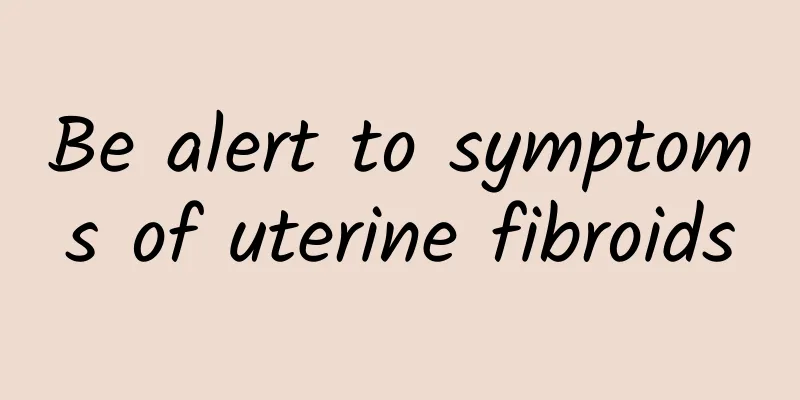What are the symptoms of uterine fibroids?

|
What are the symptoms of uterine fibroids? Uterine fibroids are common benign tumors in female reproductive organs, also known as fibroids and uterine fibroids, which are mainly formed by the proliferation of uterine smooth muscle cells. Among them, a small amount of fibrous connective tissue exists as a supporting tissue, so it is more accurate to call uterine fibroids uterine leiomyoma. It is a hormone-dependent tumor, and estrogen is the main factor that promotes the growth of uterine fibroids. Some scholars believe that growth hormone is also related to the growth of fibroids. The metabolism of ovarian function hormones is also regulated by higher nerve centers. Uterine fibroids are more common in women of childbearing age, widowed women or women with uncoordinated sexual life, and the chance of developing uterine fibroids increases. Causes of uterine fibroids: The female's birth age, after menopause, fibroids stop growing, and even shrink and disappear. The occurrence of uterine fibroids may be related to female hormones. Estrogen can cause the proliferation and hypertrophy of uterine muscle cells, thickening of the base, and enlargement of the uterus. Female hormones act through corresponding hormone receptors. The content of estrogen receptors in uterine muscle tissue varies with the menstrual cycle. In uterine fibroid tissue, the content of estrogen receptors and estradiol is lower than that of normal uterine muscle tissue. Symptoms of uterine fibroids: 1. Uterine bleeding: It is the main symptom of uterine fibroids, mainly cyclical bleeding, which can be manifested as increased menstruation, prolonged menstruation or shortened cycle. It can also be manifested as irregular menstrual cyclical vaginal bleeding. 2. Abdominal mass and compression symptoms: When the fibroids enlarge the uterus for more than 3 months or when there are large subserosal fibroids at the bottom of the uterus, a mass can usually be felt in the abdomen. Fibroids on the anterior wall of the uterus close to the bladder can cause frequent urination and urgency; huge cervical fibroids compressing the bladder can cause poor urination or even urinary retention. 3. Pain: Under normal circumstances, uterine fibroids do not cause pain, but many patients may complain of lower abdominal swelling and back pain. 4. Increased vaginal discharge: Increased uterine cavity, increased endometrial glands, and pelvic congestion can increase vaginal discharge. |
<<: How harmful is uterine cyst during pregnancy?
>>: What medicine is good for endometritis and pelvic inflammatory disease
Recommend
How to recover after endometrial thickening surgery
Normal endometrium changes periodically with the ...
Fat man loses 57kg and undergoes sleeve gastrectomy successfully
It is no longer a dream for a fat man to become a...
What are the signs of uterine fibroids growing? What will happen if uterine fibroids grow?
What are the symptoms of uterine fibroids growing...
What to do if a pregnant woman has threatened miscarriage
Being pregnant is a great joyous event, but pregn...
What should you pay attention to in your diet to prevent cervicitis? There are six major hazards of cervicitis in women
Cervicitis is one of the common gynecological dis...
Women sitting for long periods of time can cause adnexitis
Short story: Ms. Chen is an office clerk in an In...
Swedish study: 66 grams of chocolate a week can prevent stroke
Are you a chocolate lover who is still worried ab...
Taking good methods can better treat acute adnexitis
According to medical surveys, more and more women...
How does ectopic pregnancy occur?
The formation of ectopic pregnancy may be related...
Experts reveal common dietary taboos for patients with adnexitis
Female friends must pay attention to their diet a...
How to treat right appendage inflammation
Right adnexitis usually requires medication and l...
Eat glutinous rice balls during the Lantern Festival. The calories in 4 glutinous rice balls equal 1 bowl of rice! Nutritionist recommends "Colorful Bean Rice Balls", which have 40% fewer calories
The Lantern Festival is approaching, and various ...
Tests for pelvic peritonitis
Pelvic peritonitis is very common for many women....
[Video version] The more you drink to lose weight, the thinner you will be. Chinese medicine fat-burning tea is amazing! Drink a cup of wolfberry tea or astragalus tea for breakfast to promote metabolism and prevent weight gain
When it’s cold, your appetite increases, and your...
Did you run right? Efficient running tips
Are you a long-distance runner who never cares ab...









